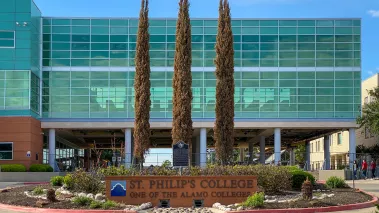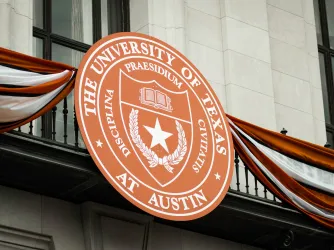Table of Contents
Longtime biology professor says public college fired him for teaching X and Y chromosomes determine biological sex

Moab Republic / Shutterstock.com
Entrance to St. Philip's College in San Antonio, Texas.
UPDATED (Feb. 28, 2024): After FIRE's advocacy, Dr. Johnson Varkey has been reinstated as a biology professor at St. Philip's College.
The alleged termination of a St. Philip’s College biology professor for saying X and Y chromosomes determine biological sex raises serious concerns about the state of academic freedom at the public college in Texas. Today, FIRE asked the college to reverse course and meet its First Amendment obligations.
The San Antonio-area community college reportedly fired Dr. Johnson Varkey earlier this year after complaints about his in-class conduct that alleged he engaged in “religious preaching, discriminatory comments about homosexuals and transgender individuals, anti-abortion rhetoric, and misogynistic banter” during class.
But according to a letter sent to the school by First Liberty — a religious nonprofit and legal organization representing Varkey — Varkey told his Human Anatomy and Physiology class in November that biological sex is determined by X and Y chromosomes. He said this was consistent with both scientific facts and his own religious beliefs. Following these comments, four students walked out of class.
If the facts match the allegations, it means a public community college violated Varkey’s academic freedom to determine how and when to introduce pedagogically relevant material into class, and his due process rights in doing so.
In January of this year, the college notified Varkey he was under investigation for an ethics violation. When Varkey asked for further information, an administrator referred him to the college’s department of human resources, which provided no substantive response. Fifteen days after receiving notice of the complaint, the college terminated Varkey’s contract.
Today, FIRE wrote St. Philip’s, reminding the public college that the First Amendment protects faculty’s in-class speech, even when it offends some students (and/or administrators). Courts have found faculty have wide latitude to teach all material related to their subject. Here, St. Philip’s cannot legitimately accuse Varkey of teaching inappropriate or pedagogically irrelevant material, given he was using college-approved material from a college-approved textbook.
And in addition to the academic freedom concerns, due process dictates that any faculty member accused of misconduct has the right to timely receive the allegations against them in writing, the opportunity to a meaningful hearing in which they can offer a defense, and other basically fair procedures to ensure the legitimacy of proceedings. In Varkey’s case, this did not happen, according to First Liberty, which says St. Philips denied Varkey basic details about what policies it alleges he violated, and denied him a hearing before his termination.
We’re asking for a prompt response from St. Philip’s. If the facts match the allegations, it means a public community college violated Varkey’s academic freedom to determine how and when to introduce pedagogically relevant material into class, and his due process rights in doing so.
We’ll keep readers up to date on any developments that arise.
FIRE defends the rights of students and faculty members — no matter their views — at public and private universities and colleges in the United States. If you are a student or a faculty member facing investigation or punishment for your speech, submit your case to FIRE today. If you’re a faculty member at a public college or university, call the Faculty Legal Defense Fund 24-hour hotline at 254-500-FLDF (3533). If you’re a college journalist facing censorship or a media law question, call the Student Press Freedom Initiative 24-hour hotline at 717-734-SPFI (7734).
Recent Articles
FIRE’s award-winning Newsdesk covers the free speech news you need to stay informed.

FIRE and ACLU of TX: University of Texas must drop unconstitutional drag ban

FAQ: Responding to common questions about the fight between Harvard and the Trump administration

George Mason University calls cops on student for article criticizing Trump


